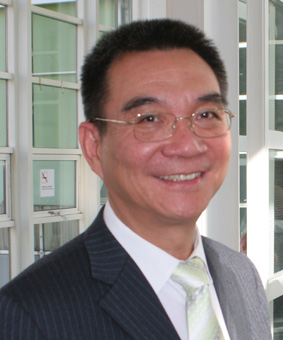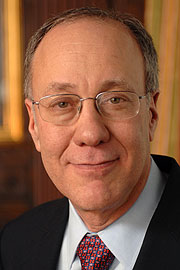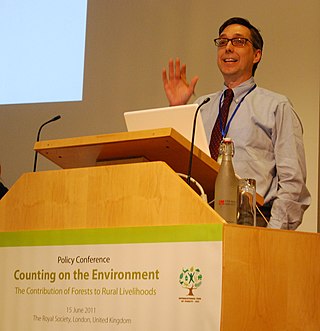Related Research Articles
Agricultural economics is an applied field of economics concerned with the application of economic theory in optimizing the production and distribution of food and fiber products. Agricultural economics began as a branch of economics that specifically dealt with land usage. It focused on maximizing the crop yield while maintaining a good soil ecosystem. Throughout the 20th century the discipline expanded and the current scope of the discipline is much broader. Agricultural economics today includes a variety of applied areas, having considerable overlap with conventional economics. Agricultural economists have made substantial contributions to research in economics, econometrics, development economics, and environmental economics. Agricultural economics influences food policy, agricultural policy, and environmental policy.

Theodore William Schultz was an American agricultural economist and chairman of the University of Chicago Department of Economics. Schultz rose to national prominence after winning the 1979 Nobel Memorial Prize in Economic Sciences.

Richard Theodore Ely was an American economist, author, and leader of the Progressive movement who called for more government intervention to reform what they perceived as the injustices of capitalism, especially regarding factory conditions, compulsory education, child labor, and labor unions.

Justin Yifu Lin is a Chinese economist and professor of economics at Peking University. He served as the Chief Economist and Senior Vice President of the World Bank from 2008 to 2012. He has been appointed as China's State Council Counsellor since September 2013.

Little Norway was a living museum of a Norwegian village located in Blue Mounds, Wisconsin. Little Norway consisted of a fully restored farm dating to the mid-19th century. It is listed on the National Register of Historic Places.
Martin Bronfenbrenner was an American economist who served as William R. Kenan, Jr. Professor Emeritus of Economics at Duke University. His publications, including more than 250 scholarly papers and five books, cover a host of topics, including aggregate economics, income distribution, international economics, and Japan. His scholarship was recognized on several occasions, including his election as Fellow of the American Academy of Arts and Sciences, and as a Distinguished Fellow of the American Economic Association.

May Louise Cowles was an American economist, researcher, author, and advocate of Home Economics. She was a member of the faculty at the University of Wisconsin–Madison from 1915 to 1958. She had many submissions published in the Journal of Home Economics, the Journal of the American Dietetic Association, and Rural Sociology. She also produced several widely read pamphlets, including Meeting Housing Needs of Older People in Rural Areas (1957), and spoke at a string of national seminars to encourage the addition of family economics to home economics instruction across the United States.
Kenneth Herald Parsons (1903–1998) was a professor of agricultural economics at the University of Wisconsin–Madison.
David Bruce Audretsch is an American economist. He is a distinguished professor at the School of Public and Environmental Affairs (SPEA) at Indiana University and also serves as director of the SPEA International Office, Ameritech Chair of Economic Development, and director of SPEA's Institute for Development Strategies (IDS). He is co-founder and co-editor of Small Business Economics: An Entrepreneurship Journal, and also works as a consultant to the United Nations, the World Bank, the OECD, the EU Commission, and the U.S. Department of State. He was the director of the Entrepreneurship, Growth and Public Policy Group at the Max Planck Institute of Economics in Germany from 2003 to 2009. Since 2020, he also serves as a distinguished professor in the Department of Innovation Management and Entrepreneurship at the University of Klagenfurt.

Roger Bruce Myerson is an American economist and professor at the University of Chicago. He holds the title of the David L. Pearson Distinguished Service Professor of Global Conflict Studies at The Pearson Institute for the Study and Resolution of Global Conflicts in the Harris School of Public Policy, the Griffin Department of Economics, and the college. Previously, he held the title The Glen A. Lloyd Distinguished Service Professor of Economics. In 2007, he was the winner of the Sveriges Riksbank Prize in Economic Sciences in Memory of Alfred Nobel with Leonid Hurwicz and Eric Maskin for "having laid the foundations of mechanism design theory." He was elected a Member of the American Philosophical Society in 2019.

Calvin Bryce Hoover was a noted economist and professor. He spent 1929–1930 in Moscow and wrote The Economic Life of Soviet Russia in 1931. Following his travels to Soviet Russia he also traveled to and researched the economies of Germany, Italy, France, Poland, Czechoslovakia, Denmark, Sweden, Norway, and Australia. He is considered the founder of the field of comparative economic systems.
Marc Leon Nerlove is an American agricultural economist and econometrician and a distinguished university professor emeritus in agricultural and resource economics at the University of Maryland. He was awarded the John Bates Clark Medal from the American Economic Association (AEA) in 1969 and held appointments at eight different universities from 1958–2016. The Clark Medal is awarded to an economist under the age of 40 who “is judged to have made the most significant contribution to economic thought and knowledge”, and when the AEA appointed him as a distinguished fellow in 2012, they cited his development of widely used econometric methods across a range of subjects, including supply and demand, time series analysis, production functions, panel analysis, and family demography.
Henry Charles Taylor was an American agricultural economist. As an early pioneer in the field, he has been called the "father of agricultural economics" in the United States. Taylor established the first university department dedicated to agricultural economics in the United States in 1909 during his time at the University of Wisconsin–Madison. He also had a brief but very influential career in the United States Department of Agriculture from 1919 to 1925, where he helped reorganize its offices and became head of the new Bureau of Agricultural Economics. Coming from a rural farm community himself, Taylor's foremost goal was always to try to improve the living conditions of farmers.
Sumner Huber Slichter was an American economist and the first Lamont University Professor at Harvard University. He was considered by many to be the pre-eminent labor economist of the 1940s and 1950s. He was adamantly opposed to the labor movement, and called repeatedly for legislation against unionization. He was also a critic of the New Deal."

The University of Wisconsin–Madison College of Agricultural and Life Sciences is one of the colleges of the University of Wisconsin–Madison. Founded in 1889, the college has 17 academic departments, 23 undergraduate majors, and 49 graduate programs.

Roland R. Renne was an American agricultural economics professor who served as President of Montana State College from 1943 to 1964. Renne was also active in Washington, D.C., and United States overseas agricultural economics work. He was the 1964 Democratic candidate for governor of Montana.

Douglas Warren Diamond is an American economist. He is currently the Merton H. Miller Distinguished Service Professor of Finance at the University of Chicago Booth School of Business, where he has taught since 1979. Diamond specializes in the study of financial intermediaries, financial crises, and liquidity. He is a former president of the American Finance Association (2003) and the Western Finance Association (2001-02).

Burton A. Weisbrod is an American economist who pioneered the theory of option value, and the theory of why voluntary nonprofit organizations exist, He also developed the methodology for valuing voluntary labor. He advanced methods for benefit-cost analysis of public policy by recognizing the roles of externality effects and collective public goods in program evaluation. He applied those methods to the fields of education, health care, poverty, public interest law, and nonprofit organization. Over a career of fifty years, he published 16 books and over 200 scholarly articles. He is currently the Cardiss Collins Professor of Economics Emeritus and a Fellow of the Institute for Policy Research at Northwestern University.

Gerald Shively is an American economist and Professor in the Department of Agricultural Economics at Purdue University. He teaches and publishes research articles and books related to contemporary policy-related issues in economic development. His specializations are in poverty, food security and sustainable development.
Carlisle Ford Runge is a professor of applied economics and law at the University of Minnesota.
References
- ↑ Jenkins, John W.; Teicher, Barry; Hobson, Asher (November 9, 1983). "Oral History Interview: Asher Hobson (361)" – via minds.wisconsin.edu.
{{cite journal}}: Cite journal requires|journal=(help) - ↑ "Scholarships | The Fletcher School". fletcher.tufts.edu.
- ↑ "COLUMBIA TO STUDY FOOD MARKET HERE; Picked Class, Under Prof. Hobson to Seek Solution ofAcute Problems.GOVERNMENT TO ASSISTImproved Conditions Are Necessaryin the Distribution of Farm Products, Expert Asserts. (Published 1921)". July 17, 1921 – via NYTimes.com.
- ↑ "On Wisconsin: An end for Little Norway and a possible return trip for its signature building". Star Tribune.
- 1 2 "Archival Resources in Wisconsin: Descriptive Finding Aids: Summary Information". digicoll.library.wisc.edu.